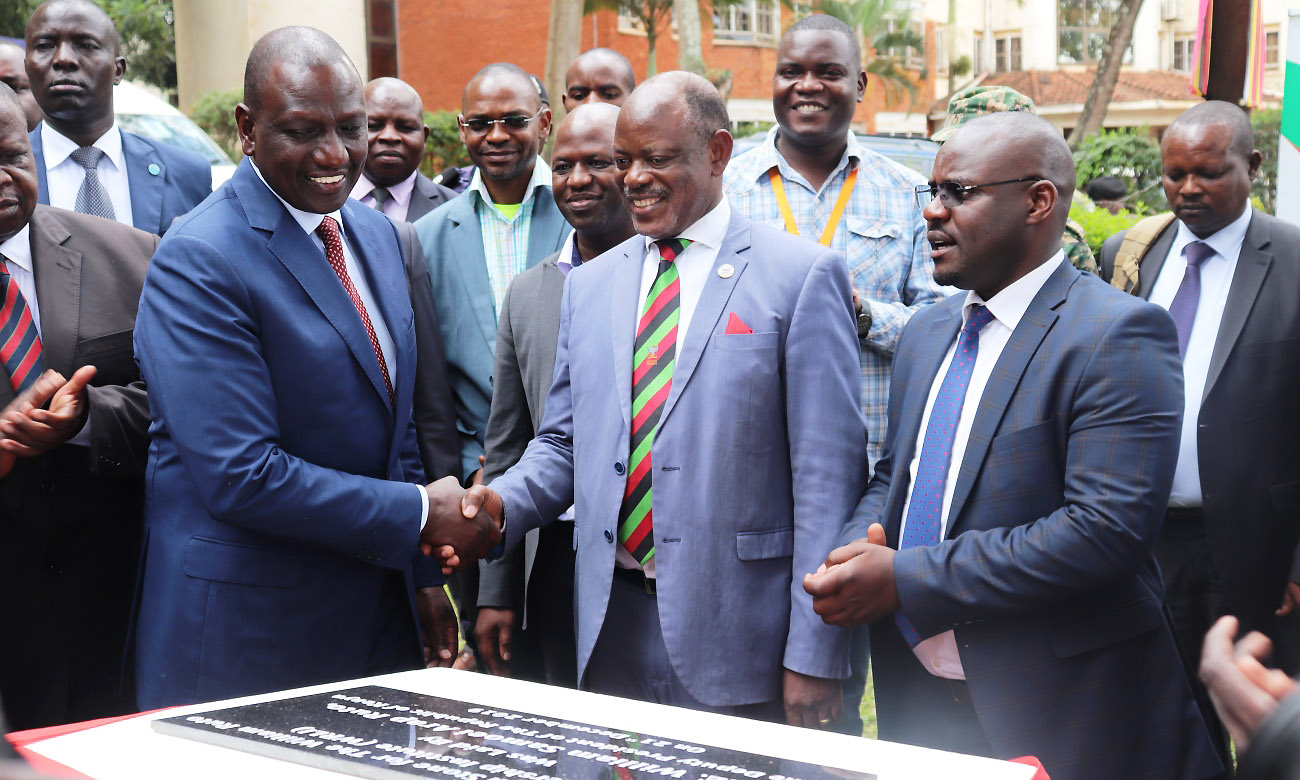The Deputy President of Kenya, H.E. Dr. William Samoei Ruto, has lauded Makerere University for championing the setting up of Leadership Institute named after him that will inspire students to become great leaders.
He said this during the laying of the foundation stone for William Samoei Ruto Leadership Institute at the Department of Performing Arts and Film Grounds at Makerere University on Saturday 21st December 2019.
"I am proud to be associated with this initiative at East Africa’s oldest University and highest Institution of learning for pioneering intervention in the twenty-first century," Dr. Ruto told guests.
This was the Deputy President’s first time to visit Makerere University, which event coincided with his birthday.
"I am happy to be in this great Institution of learning. It's a tremendous honour for me to join distinguished guests in this auspicious ceremony," he stated.
"I am immensely honoured in choosing me to be in the magnificent historic achievements of Makerere University," the Kenyan Deputy President added.
He stressed that it was important for East Africans to work together as a community rather than each country working alone.
"If we work together, the better for all us," he told guests who included Makerere University as well as Kenyan and Ugandan Government officials.

He implored the Heads of State to begin a new engagement and forge a new framework that would work for the best interests of the people of East Africa.
The Kenyan Deputy President agreed with President Yoweri Museveni’s philosophy of a United East Africa and called for removable border barriers to enable the people engage in trade freely.
"The borders existing today should not be barriers and roadblocks but should be converted to bridges as stepping stones to work together," he stated.
He emphasized the need for expediting East African Federation as it will advance the prosperity of the people in the region.
"The sooner we forge East African federation, the sooner our prosperity becomes meaningful to our people," he said.
The Deputy President pledged to support the Institute named after him saying he will play his role of inspiring young people to become great leaders.
The objectives of William Samoei Ruto Leadership Institute include; developing innovative approaches to teaching and learning about Africa, collaborating with similar institutes in Africa and globally to deepen the understanding of Africa in all its complexity and involve common perspective on global issues.
Other objectives are; to contribute to discussion, analysis and resolution of central challenges facing African societies through research and extension work, enhancing and enriching intellectual and cultural life, establishing an environment for flourishing study and debate on African languages, philosophies, social and political systems as well as strengthening relationships between academic and indigenous intellectuals as basis for reclaiming indigenous knowledge and integrate this to local communities.

Delivering his welcome remarks, the Vice Chancellor of Makerere University Prof. Barnabas Nawangwe invited Makerere University students of Performing Arts and Film to sing a happy birthday song to the Kenyan Deputy President William Ruto, who was all smiles as the students sang.
He commended the brains behind the H.E. Dr. Ruto Leadership Institute saying it’s good for the youth as they will be inspired.
He lauded Dr. Ruto for his resilience and determination to become a global leader and urged the youth to embrace the same principles.
Prof. Nawangwe informed guests that Makerere University is a premier university and the best black university on earth which has produced great leaders and professionals in different fields such as writers, doctors, lawyers, artists and others.
"Makerere University remains the most important institution of higher learning in Africa and beyond," Prof. Nawangwe told guests.
He revealed that the University is strategizing to become a leader in research on the continent and globally.
The Minister of East African Affairs, Hon. Kahinda Otafiire, who represented the Prime Minister Rt. Hon. Dr. Ruhakana Rugunda underscored the need for unity of the people of East Africa.
"Unity is our strength as African people, we have a common destiny," Otafiire stated. He also encouraged partner states to work towards improving the lives of their people. He commended the setting up of the William S. Ruto Institute as it be will a center of intellectual debate for students in the East African region.
Dr. Paul Bamutaze, the President of East Africa Book of Records (EABOR) told guests that the Institute will be inaugurated as a centre for the Annual Ruto Public lecture where young people in East Africa would encouraged and inspired to become great leaders.
The Secretary General of EABOR, Mr. Simon Gikuru informed guests that the William S. Ruto Leadership Institute is important as a centre where youth will interact and be inspired to believe in themselves and acquire leadership skills. He also hailed President Museveni for endorsing the initiative.
The representative of Kenyan students at Makerere University, Mr. Ahmed Abdirahman thanked the Heads of State in East of Africa for the existing bilateral relations which have enabled students from Kenya to study at Makerere University-the premier university in the region.
Article by: Mak Public Relations Office


 General1 week ago
General1 week ago
 General1 week ago
General1 week ago
 Health3 days ago
Health3 days ago
 General1 day ago
General1 day ago
 General1 week ago
General1 week ago



